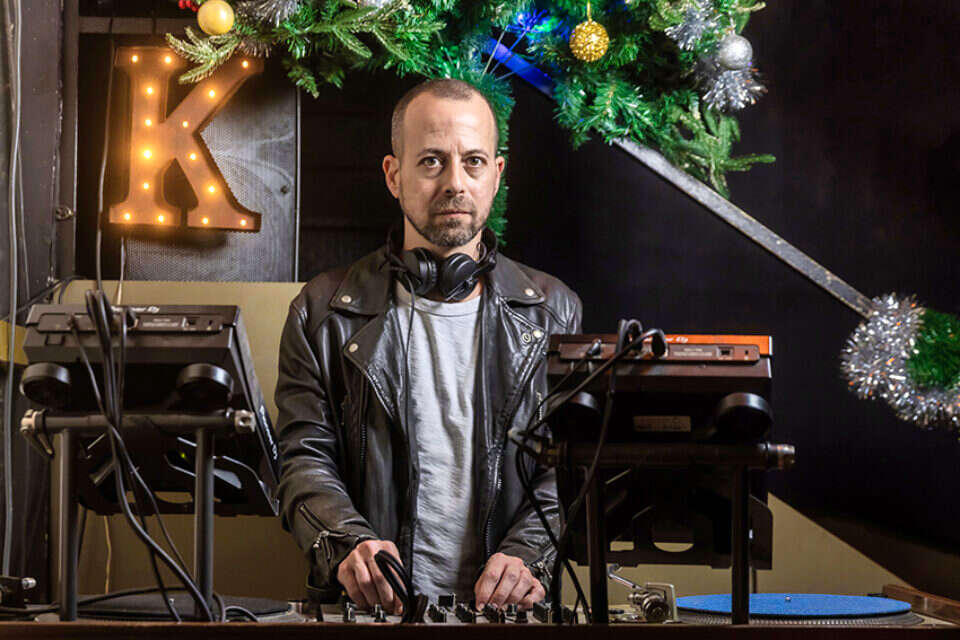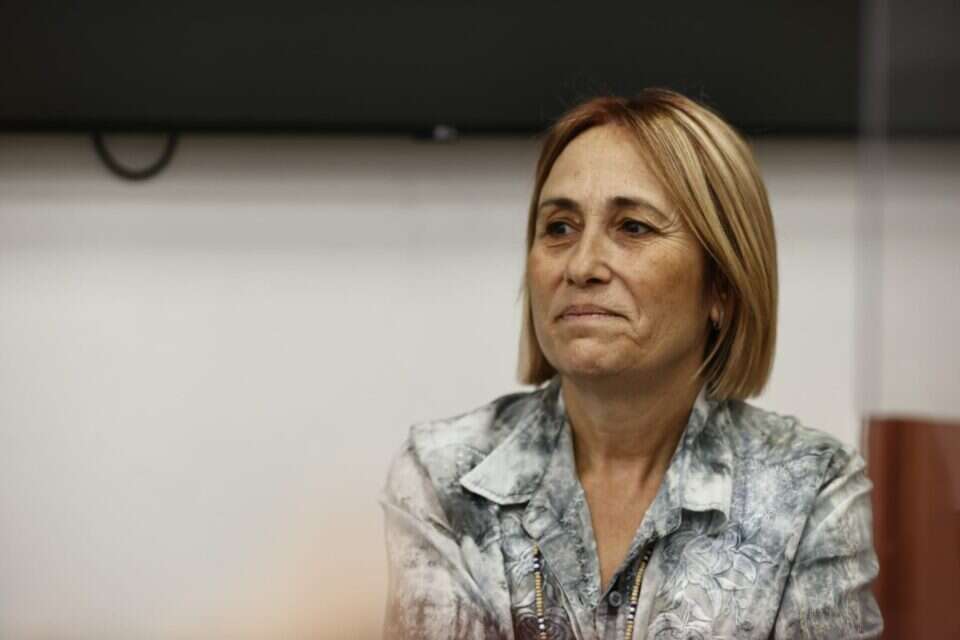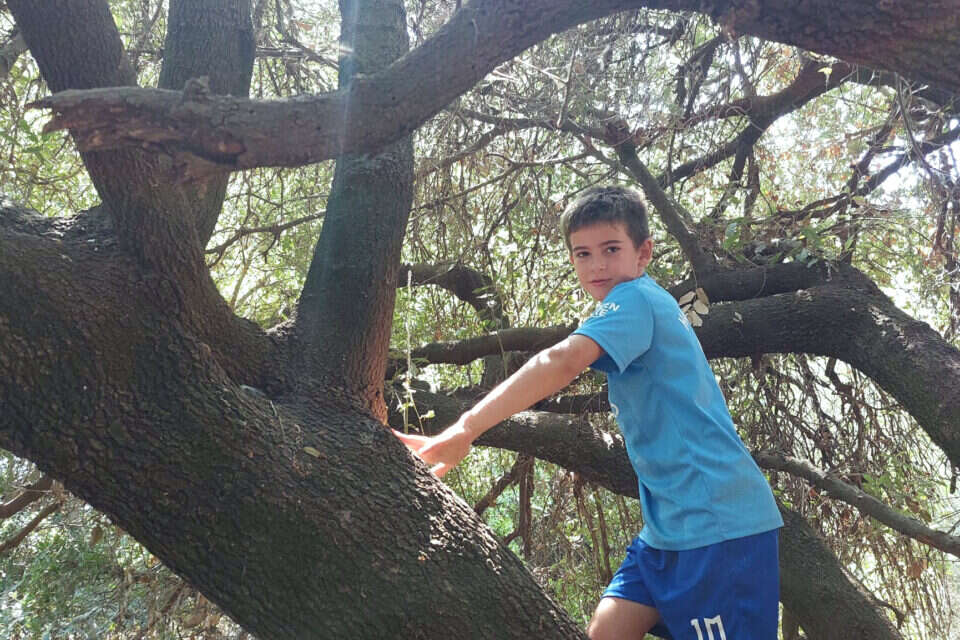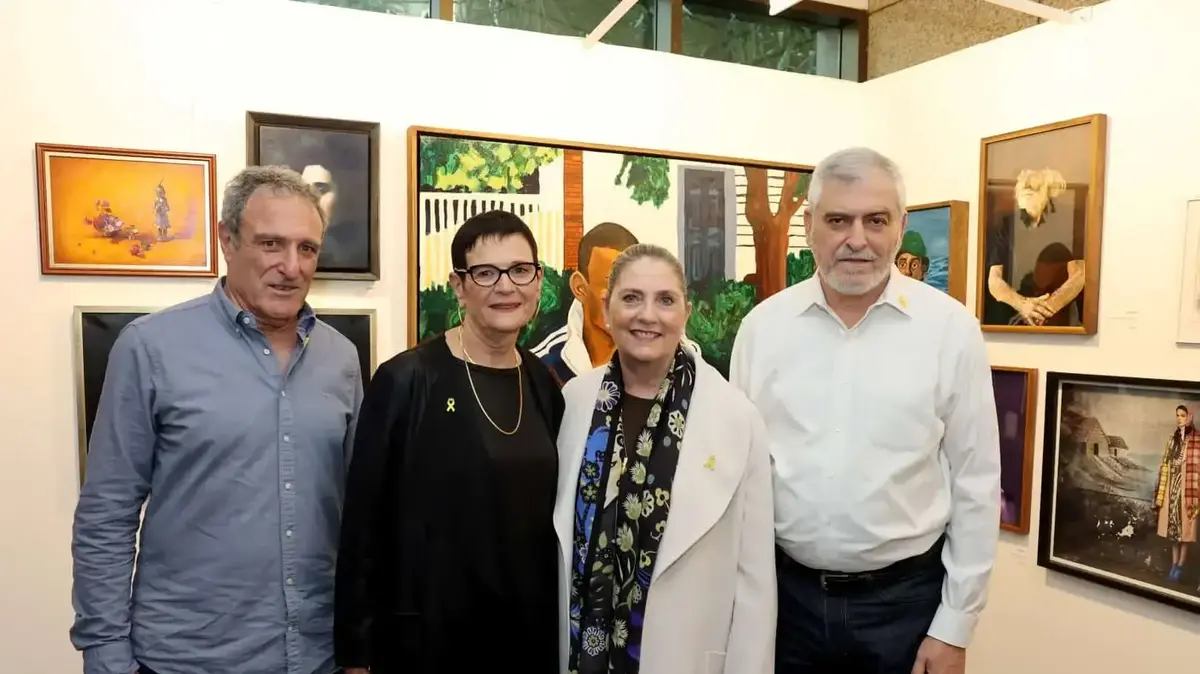The last time I met Niv Hadas before this interview was a month ago, at a party of an old and beloved radio station that closed five and a half years ago.
What on paper was supposed to be less of a nostalgic evening and more of a one-off comeback and a sweet reminder of the parties that were once considered the best of their time, turns out quite early in the evening to be a bitter sobriety pill.
Less of a blast from the fast and more of a last and not particularly impressive glimmer of a long dead star.
A dance floor predation was not recorded there, in an evening that was more dedicated to nostalgia and "Remember when" conversations (the lowest type of conversation there is - a reference that any TV geek will understand, and a dialect is definitely one).
Later, he will give his take at the party the title of "my worst set ever", he will explain (and accurately) about a perfect mismatch between DJs, space and audience, and we will both agree that it was a failed event.
One that raises a discussion about the role of the cultural mediator and critic, a title he has carried in quite a few press systems (full disclosure: the writer of these lines worked under him about a decade ago) in the contemporary media world.
"It's all related to the democratization of the media and the means of expression," he says.
"Galit Distel Atabrian became a singer from posts on Facebook. She was a writer but not a publicist. The posts on Facebook made her career. And what a career, a pension from the state for the rest of her life."
exactly. You started operating in other times, when shaping public opinion and cultural tone required a little more than access to the web.
"You're asking if I don't miss the cultural importance of the mediator? I actually feel good about the place I moved to, which is television criticism. People are terribly looking for it, looking for something to see. It's the preferred form of entertainment today, the most consumed culture and the most popular means of artistic expression. So let's say that on an ego level I don't feel any kind of loss of relevance. It came out to me on Fox. In 'Gallery' Shishi and also in my podcast, this is what we try to do, to sketch some kind of zeitgeist. Even where you write, you do it trying to do it for its readers." .
"Became Sarah from Facebook posts."
Galit Distal Atabrian, photo: Oren Ben Hakon
Maybe doing it in "Haaretz" is easier, because its audience is specifically looking for these things. From the outside, it's not exactly that they fought over the culture portfolio in the division of the spoils of the current government.
"I think people are thirsty for it, precisely because of the flood of information. It's not just that 'what are you seeing now?'
It's always the most heated conversation at the social gathering. I haven't flown on the 'White Lotus' but look how much conversation it generates, how it starts social gatherings. It's a real energy generator. People talk about the characters there as if they were flesh and blood. It's a credit to Mike White who created it , but it also shows how much culture still preoccupies people and they are looking for that thing of what is right to see now. This happens less in music, where there is a feeling that everyone has carved their own path. There is no longer something that is common in taste, everything goes with everything. Playlist of Someone can include something from Eurovision '76, a song by Leonard Cohen and also Noa Kirel's 'Panthera'."
The time of musical snobbery, which is at the heart of the critic's self-definition, has actually passed.
"And that's good, isn't it? It's true what you say, that it has led to a decline in the audience. There is no longer anyone who says, 'This is what you need to listen to now.' I edit his son sometimes and I read him to read his son, not to know what Listen. I think he is a good interviewer and has sharp insights and diagnoses about songs, but at the level of taste it becomes very autonomous."
The same unsuccessful party also offers a direct link to raise the topic of nightlife in Tel Aviv and its less than ideal state (even if it's already a cliché at this point), after the closing of clubs like the Block and bars like Lucifer.
A particularly difficult case was recorded when, as if to add insult to injury, a branch of "Victory" now stands in the place where Alphabet was once located.
Whose victory was recorded here - it's not really clear, but the place of the amplification system, the benches and the queues for toilets are now occupied by dairy products, cans, a sausage section and a loser tag.
"I feel good about the place I moved to, which is television review. People are terribly looking for it, looking for something to watch. It's the preferred form of entertainment today, the most consumed culture and the most popular means of artistic expression. So let's say that on an ego level I don't feel any loss of relevance"
"In my experience, there is never a vacuum," he refutes the rumors about the scene's death.
"It always moves in waves, there is always a feeling that there is some kind of crisis. So it is true, they closed the block, but since the beginning of the corona virus it has been rather faltering and even before that it has already entered some corner of Romany minimal where it is not clear what it has to do with the taste, the scene or the local creation.
I talk to my natural audience, in quotation marks, in the column I write and the podcast I present and with people who follow me on Twitter, and I want to reach people who are not exposed to me on Ha'aretz.
I don't think mine and they can't have a common conversation and that they can't enjoy the book.
If they choose to read it?
I wish
It will be a lot of fun."
"The breakfast didn't go well, but the pie is probably going better. And now there's also 'Bor'. They bought the bootleg, I don't know what will happen with it, but there are attempts. There's a place in Meser that they just opened called 'Dom TLV'. They took the names of Two old places and connected them. Its logo is awfully similar to that of the block, so let's say it's an inspiration. But it's a new place. Go to the frequency. Was there once something like the frequency here? A supermarket of clubbing and alternative culture and music. Things happen there and there are parties. I I think that a club like the Block is really less suitable for now. Like there is this segmentation in playlists, that everyone has their own playlist and their watch list, everyone has a slightly different taste and mini-scenes become. It's cool. Because things crash and crumble and then come together into something new." .
So now it is nothing more than a liminal phase, until a new consolidated form is obtained?
"I think so. Things are constantly dynamic, you never know what will happen. The current government of the municipality tries terribly to regulate things, to push nightlife to the edges, to the complexes. In the end somehow it escapes back. There is always some kind of readjustment."
Variable levels of eccentricity
"The night is forever" is not only a romantic worldview as it is also the name of his new and first book.
In recent years, Hadas, 45, has served as a sub-editor in the "Gallery" supplement of the "Haaretz" newspaper, in addition to writing columns and presenting a podcast on television.
He dedicated his debut book, edited by Noa Manheim and Roah Or, published by Kinneret Zamora Dvir, to Shira Meikin, his partner and herself an editor and journalist at De Marker and Haaretz.
True to the well-known writing advice attributed to Mark Twain "write about what you know", Hades has woven a semi-detective novel (even if there is no doubt as to the identity of the criminal in it), whose plot takes place between newspaper systems, club spaces, smoky bars and back rooms of clubs.
Like the Tel Aviv night and the Israeli media, it is also full of characters with varying levels of eccentricity and sobriety.
Between opinion columns and criticism (which sometimes seem just like authentic items and provide some of the fun moments in the reading experience of "The Night is Forever") they drink, do drugs, move on the high vapors of a good party and are thrown to the ground in low moments, which usually come in the early morning.
"I got married in Castiel's furniture store, I knew him and I was present in situations where he didn't recognize me, that he didn't know who he was. But he wouldn't have finished himself at the same level (as the victims) because he had to function. That's why I say - the means are meaningless Or at least negligible. Because there was malicious intent, and that's the important thing."
This is not even an exaggerated description of the clubbing life, which was written when those questions completely evaporated in the heyday of the Corona virus and Hadas found himself moving with his partner to the Kfar Haim settlement in Emek Hefer, where he still lives today, after years in which he was an integral part of Tel's entertainment landscape Spring.
Upon hearing the suggestion that this is a love song to the city he left, a Freudian ear reception (perhaps) makes him hear the term "farewell letter".
"I'm maybe a bit mourning my place in this scene, and coming to terms with my new place," he says.
that he?
"'Clan elder' is such a rude expression, and I'm not a clan elder either, but I'm very old. I'm a Clubber from '94. On the first of December '94 there was a vampire party at Allenby 58, it was the first party I went to. I don't know how I was I sometimes look at people my age at parties today. It's very strange."
You say 'I'm 45 years old, maybe I don't need to do these things anymore?
''
My friends and I have something different from what is happening now, but it is relevant and corresponds to him.
I enjoy recording with friends the most, because then I can also dress up in the process and it's a lot of fun for me.
We meet on the stand, play music, listen to each other and always come up with new ideas.
It's also a pastime for me.
I still get tickled if I see a DJ's name that I want to hear, no matter if Israeli or from abroad. Once every two weeks I get to sleep in the city on the weekend."
And come to the party as Blaine?
"I'm a little less capable. I can get into it, start dancing and the situation won't be alien to me. A friend took me to an after party a few months ago and at around seven in the morning I found myself as much as I used to be. Within a second I felt at home."
Maybe you're experiencing what a lot of people who went through the night have experienced at some point. that it was a phase, a period in their socialization process in the city.
"Yes, those who say 'I'm not there anymore'. When I was younger I was one of those who called people like me 'the fried'. Now I'm the fried. I mean the one who can't break free."
There are also those who see that period as a toxic period of time in their lives.
I know someone who used to go out to the same bar every night and once told me "nothing good grows here. I could have been someone if I hadn't been drawn here".
Maybe it's just a good excuse?
"It's psychological surgery on a dime, but it can really be an excuse to say, 'Oh, it's tonight.' At work I came to these places, which played on my weak points and it dragged me to a very bad place. It can happen in many places and it is true that the night is a trigger for many things, but it can also take you to a very good place. I look at myself but not only at myself. I remember Israel Aharoni, who once told me that the best thing that happened to him was that he started going to parties at an old age and it helped him lose weight and find his center."
You know what the obvious joke is here.
"Of course, and I also told her, but it's not only that. I think that when a person really spends time, then he is free. It's a feeling that is priceless. It can happen alone at the bar or with friends or on the square or here in the corner with a joint in your mouth. There is some kind of liberation that is truly amazing and cannot be described to anyone who is not in it. My closest friends owe it to me. The deepest thoughts I had in my life were about the expansion. It is my safe space."
Tel Aviv as a ghost city
The Tel Aviv of the book is a kind of dystopia (not entirely fictional).
One in which the unholy trinity of capital-government-underworld dictates, even more than ever, the agenda and the workers are no longer concerned with trifles such as visibility.
Some of the descriptions in it, of streets like King George or centers like the empty Dizengoff Center, are very reminiscent of the ghost city that Tel Aviv became during the long closures.
The time he started writing the book, after what was originally a courtship tactic had to be expressed in reality, and a side hobby that anyone involved in writing and editing will tell you is about the last thing you feel like doing after a day's work, became a commitment.
"When I started with Shira, I told her that I was writing a book and I already had a chapter. For the Davin!", he explains.
"Then, when we were already together, she kept asking me, 'What about your book?'
Is the book good? Do you have characters yet? Are there dialogues?'
So, on vacation in Greece, I said, 'Kosamo, now I'm writing a chapter!'. Since then, I've written three paragraphs, a thousand words, every night."
"He erased himself as he erased his victims."
Alon Castiel, photo: Gideon Markowitz
How did you come to write a dystopian crime novel?
"I wrote the first chapter after the prologue on my own initiative for a noir anthology written by Assaf Gavron and Etgar Keret. I sent it even though they didn't ask me to. They said to me, 'It's great, but like, what do you want us to do with it? We have a quota of stories, we closed with everyone and you don't in the programs'. I love crime stories, crime fiction. And I read an anthology edited by James Ellroy, the writer who wrote 'LA Secrets' and 'The Black Dahlia', of noir literature from the beginning of the 20th century. What distinguishes them from detective fiction is that She asked for stories from the pits of life. I said, 'Come on, I'll write all kinds of little crime stories.' Tonight, which is something I encountered, I experienced it and I got to confront it from all aspects of it."
You don't need to know too much about the life of the city to make the connection between Lior Halafi, the character of the sex offender who appears in the book, and Alon Castiel - a well-known and well-connected man who worked for many years in the nightlife, until he was sentenced to prison after dozens of complaints about sexual offenses against him, which included harassment, Indecent acts, assault and rape.
In the book, as in life, the offenses were committed under the auspices of Sam.
In the case of "The night is forever" it is an imaginary one called NG - acronym for No Guilt.
His main virtue frees Notello from moral responsibility (in his own eyes) when committing a crime.
For Hades, this is a plot line that he drew from his experiences in real life, after seeing Castiel in action and being among those who acted to stop him.
Isn't it a bit problematic to write about such a charged topic from a man's position?
"I tried to tell a story that is different. Telling this story is very difficult and Elon Castiel is not my only inspiration for this story. He is definitely not the only case. I tried that the characters I wrote about were not one-dimensional and victims, but round, full and complete. I am telling a story which is mine."
And still very close to home.
"I didn't have to do a lot of research on the subject because someone I was dating went through it and unfortunately I saw it work, so I can tell you exactly what it did. That's how the idea for the drug I came up with was born. Part of what Castiel would do is he would erase himself just as much as he would erase them. I don't think it's relevant whether or not Sam Rape was involved. In the end what happened was that he was a rapist. I wanted to show that he erased himself as he erased them because he had to remove the element of guilt. I got married In Castiel's furniture store, I got to know him and saw him in situations that were not necessarily always related to sexual abuse, in which he was simply finished, not seeing eye to eye. I was present in situations where he did not recognize me, moments when he did not know who he was. But he would not finish himself at the same level (Like the victims) because he had to function. That's why I say - the measure is meaningless or at least negligible. Because there was malicious intent, and that's the important thing."
"Everything has become terribly homogenous"
Another plot line that appears in the book deals with an editor who is forced to compromise his values in order to survive in a world where journalists are handed over to the authorities for violating the regime's laws.
In timing that feels like a great marketing campaign, the book comes out in one of the most charged months (also in Israeli terms) that the country has known, which includes the legal reform of Yariv Levin and talk of closing the broadcasting corporation.
He raises questions about adaptation, the challenge of government review institutions and freedom of the press.
You recently said in a podcast interview that "Israel today can also be subversive."
"In many places, yes. I read the opinion section of 'Israel Today' quite a bit because it is also my job and I read the newspaper's magazine because it is my job and there are things in there that you don't see a commanding spirit that goes through all the sections and all the positions and all the opinions. Unlike other places. There are places where it is much more noticeable."
Maybe you also wanted to get out of your comfort zone.
"My parents had a lot of friends in the Likudniks and they would argue about politics. But when the crackling came at the end of the meal it would end with 'see you next Saturday at the beach'. It hurts me a little that everything has become terribly homogenous. Also the environment you surround yourself with and the people you turn to to them and your feed.This echo chamber also has an impact on the everyday, not just the people you follow and who follow you.
"There are people I would be happy to be friends with even though they are right-wing, so what? It becomes such a thing that if I'm on one side of the fence then I have to obey all kinds of laws and if I'm on the other side I also have to obey his laws. You see this a lot in right-wing confrontations But also on the left. Do you disagree with it to disagree with it or because this is your position? These are terribly strange times for socialization processes. Israeli society is going through this process and it is reflected in how much we blend in with the people we surround ourselves with."
There is no doubt that you are exposed here even to those who are not among your captive audience.
"The seemingly natural thing was that I would be interviewed by Mossaf Ha'aretz, but it was the most indecent exposure. I wanted the exact opposite, to distance myself. I talk to my natural audience, in quotation marks, in the column I write and in the podcast I present, and with people who follow me on Twitter, and I want to reach people who are not exposed Eli at Ha'aretz. I don't think that they and I can't have a common conversation and that they can't enjoy the book. If they choose to read it? I wish. It would be a lot of fun."
were we wrong
We will fix it!
If you found an error in the article, we would appreciate it if you shared it with us









